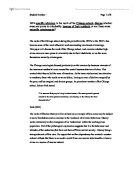With reference to areas of social policy, do you agree that "neither government through massive welfare state nor private enterprise based on free market policies have shaped a society which is free from poverty, crime and violence"?
With reference to areas of social policy, do you agree that “neither government through massive welfare state nor private enterprise based on free market policies have shaped a society which is free from poverty, crime and violence”
Government intervention and free market policies have been the two contrasting approaches to social policy and the welfare state since the end of the Second World War. Massive intervention has been more commonly advocated by the Labour party and has been used by the Conservatives on occasions. Free market policies were not really implemented until 1979 with the emergence of the New Right. However, despite this differing approaches crime and poverty in Britain has continued to rise throughout the 20th century.
Education is an area of social policy that can be directly linked to crime and poverty. A good education can instil discipline and good morale principles turning people away from crime and by giving people a good start in life. Both intervening and free market approaches have been used by governments in regard to education. The establishment of the tripartite system in the 1944 Butler Education Act was massive government intervention as was the establishment of the comprehensive system in 1964; both were introduced under Labour governments. Since 1979 Education has become more centralised, a move introduced under the New Right Conservatives. The introduction of the national curriculum set minimum standards in schools with the curricula being set by central government. Local authorities’ part in education was also weakened through the establishment of Local Management Schools and the free market approach of ‘market forces’ in schools through league tables looked to make schools more competitive. Thatcher’s changes were implemented in the 1988 Education Reform Act. Under New Labour there has been a continuity of education ‘market forces’ with further emphasis being placed on league tables and teacher performance through performance related pay. Blunkett’s ‘Head Start’ programme offering free early education to 3 and 4 year olds has been Labours main attempt to combat social exclusion through education, in the belief that an early education can counter the effects of a deprived upbringing as poverty is clearly linked to crime. However, despite these differing approaches and measures basic problems such as truancy remain. Truancy can be directly linked to youth crime and as of yet no government has significantly clamped down on it and the youth crime culture that surrounds it. In fact, youth crime has continued to rise. Attendance in inner city comprehensives is poor and the issue of weapons in schools still exists. Petty crime such as graffiti is still widespread and can often lead on to harder crimes. So in education both intervening and free market approaches have been implemented with efforts to combat youth crime but with little affect on reducing crime.







